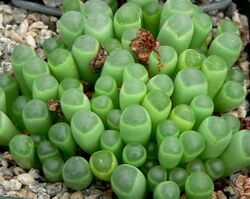Fenestraria (nonfiction): Difference between revisions
Jump to navigation
Jump to search
No edit summary |
|||
| Line 1: | Line 1: | ||
[[File:Fenestraria_aurantica.jpg|250px|thumb|''Fenestraria aurantica'' (University of California Botanical Garden).]]'''''Fenestraria''''' (known as '''babies' toes''' or '''window plant''') is a (possibly monotypic) genus of succulent plants in the family ''Aizoaceae'', native to the Namaqualand in Namibia. | [[File:Fenestraria_aurantica.jpg|250px|thumb|''Fenestraria aurantica'' (University of California Botanical Garden).]]'''''Fenestraria''''' (known as '''babies' toes''' or '''window plant''') is a (possibly monotypic) genus of succulent plants in the family ''Aizoaceae'', native to the Namaqualand in Namibia. | ||
In the wild, the plant commonly grows under sand, except for the transparent tips, which allow light into the leaves for photosynthesis. The plant produce optical fibers made from crystalline oxalic acid which transmit light to subterranean photosynthetic sites. | In the wild, the plant commonly grows under sand, except for the transparent tips, which allow light into the leaves for photosynthesis. | ||
The plant produce optical fibers made from crystalline oxalic acid which transmit light to subterranean photosynthetic sites. | |||
== In the News == | == In the News == | ||
Revision as of 05:12, 19 August 2016
Fenestraria (known as babies' toes or window plant) is a (possibly monotypic) genus of succulent plants in the family Aizoaceae, native to the Namaqualand in Namibia.
In the wild, the plant commonly grows under sand, except for the transparent tips, which allow light into the leaves for photosynthesis.
The plant produce optical fibers made from crystalline oxalic acid which transmit light to subterranean photosynthetic sites.
In the News
Fiction cross-reference
Nonfiction cross-reference
External links:
- Fenestraria @ Wikipedia
- Oxalic acid @ Wikipedia
- Photosynthesis @ Wikipedia
